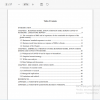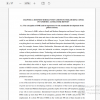Тема: Business Model Innovations by SMEs In Response to Covid-19 Pandemic: Evidence from Case Study
Закажите новую по вашим требованиям
Представленный материал является образцом учебного исследования, примером структуры и содержания учебного исследования по заявленной теме. Размещён исключительно в информационных и ознакомительных целях.
Workspay.ru оказывает информационные услуги по сбору, обработке и структурированию материалов в соответствии с требованиями заказчика.
Размещение материала не означает публикацию произведения впервые и не предполагает передачу исключительных авторских прав третьим лицам.
Материал не предназначен для дословной сдачи в образовательные организации и требует самостоятельной переработки с соблюдением законодательства Российской Федерации об авторском праве и принципов академической добросовестности.
Авторские права на исходные материалы принадлежат их законным правообладателям. В случае возникновения вопросов, связанных с размещённым материалом, просим направить обращение через форму обратной связи.
📋 Содержание
INTRODUCTION 6
CHAPTER 1. BUSINESS MODEL INNOVATIONS BY SMEs DURING COVID-19
PANDEMIC: LITERATURE REWIEV 9
1.1. The conception of SME and its importance for the sustainable development of the
global economy 9
1.2. Businesses' standard responses to a crisis 11
1.3. Business model innovations as a response of SMEs to threats 14
1.4. Summary of the Chapter 24
CHAPTER 2. EMPIRICAL EVIDENCE OF SMEs BUSINESS MODEL INNOVATIONS DURING 2020 COVID-19 PANDEMIC 26
2.1 Widespread of COVID-19 and its impact to humankind 26
2.2. Empirical research strategy 33
2.3. Within case analysis 35
2.4 Main findings and discussions 44
CHAPTER 3. DISCUSSION AND CONCLUSION 47
3.1 Summary of essential results 47
3.2 Contribution to research 48
3.3 Managerial implications 49
3.4 Limitations and outlook 50
REFERENCES 51
APPENDIX 1. INTERVIEW QUESTIONS 56
APPENDIX 2. INTERVIEW QUESTIONS (RUSSIAN VERSION) 57
📖 Введение
Since the beginning of the COVID-19 pandemic in late 2019, it has had a devastating impact not only on human health but also on countries' economies. The supply and demand system was destroyed as a result of various limitations imposed around the world to limit the spread of COVID-19, such as lockdowns and quarantines. Pandemics have far-reaching consequences that affect all countries and sectors. Small and Medium-Sized Enterprises (SMEs) according to many researchers, during crises, suffer more than large firms, due to “liability of smallness” and during crises are in the most vulnerable position, especially in protracted crises (Aldrich, Auster, 1986, Robbins and Pearce 1993, Latham 2009). It is obvious that COVID-19 is a prime example of a crisis in which all the negative consequences for SMEs manifest themselves in the most striking way. Due to prevention policies implemented by governments in several jurisdictions, SMEs have encountered an extraordinary lack of labor and production inputs. In Russia according RSPP report on the situation in Russian companies on against the backdrop of the COVID-19 pandemic possible to conclude that a fifth of companies are in a critical position: they are not able to service the principal debt or pay first priority payments (taxes, insurance premiums, salaries) to secure principal and interest external funding is needed and about 60% of small businesses have determined the level of financial impact on the company as high.
When studying such a topic, it would be relevant, as theoretical and practically meaningful, to focus on business models innovations that SMEs could implement during the pandemic and post-pandemic time of COVID-19 to find out the ways to survive and mitigate the effects of the crisis as well as to find new opportunities for growth and development. Various kinds of strategies, advantages, theories will consider studying the effectiveness of business models. The research can be done by analyzing different cases among industries in Russia as an emerging market and across the globe, exploring the main trends of activity globally, finding correlations between success and failure decisions. Such research will help to fill the research gap associated with a lack of theoretical and practical studies on the current topic in post-pandemic time in terms of business model innovations for SMEs.
Research gap. The research gap is the lack of studies of innovation business models in terms of COVID-19 repercussions, especially in managerial innovations in Russian market. Previously, entrepreneurs living in our time never faced the challenges caused by the pandemic. That is the reason why they need scientifically supported approaches in purpose to answer to that problem effectively. Moreover, usually, innovations consider as something technological, but that study will enclose managerial innovation approach as well.
Whereas threat rigidity theory (Straw, Sandelands, Dutton, 1981) indicates that companies use established and known processes to respond to challenges by freezing innovation when confronted with a danger, a number of studies have found the opposite to be true, with organizations becoming more proactive in crisis situation by launching new strategies and innovations to overcome the barriers and challenges that SMEs face in order to succeed and survive.
The research goal of the study of the study is to explore how business model innovations can be successfully implemented in SMEs in response to COVID-19 related changes in the business environment to overcome the crisis and seize new opportunities. In order to achieve this goal, a number of research questions need to be answered:
Q1: Against the backdrop of the COVID-19 pandemic, what challenges do SMEs face?
Q2: How have business model innovations been implemented in response to COVID- 19?
Q3: What has been the effect of business model innovation?
Research strategy. Used a multiple-case study as an empirical research approach to answer these research questions. To gather data, a variety of methods will be employed, including semi-structured interviews with SMEs' top executives, secondary data sources such as published interviews, company websites, and social media. The goal is to learn how the COVID-19 pandemic has affected SMEs in Russia and worldwide, how these businesses are reacting, focusing on successful and unsuccessful cases of business model innovations. The study comprises of five Russian SMEs which implemented business model innovations during the pandemic. The research is based on comparing cases and identifying patterns that can be explained by theoretical frameworks. The research focused on SMEs business model innovations as a response to COVID-19 pandemic....





